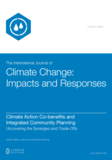Engaging in climate action through integrated sustainability strategies can yield benefits for communities in more effective ways than through compartmentalized approaches. Such strategies can result in co-benefits, that is, community benefits that occur from acting on climate change that extend beyond mitigation and adaptation. For example, creating more walkable cities can be a strategy for reducing greenhouse gases, but can also lead to healthier communities.
Climate strategies with co-benefits can result in “win-win” situations and thus improve practices for integrated community planning. However, this planning approach also presents challenges because some co-benefit strategies may also have associated trade-offs and/or barriers. MC3 conducted research on the co-benefits of climate action, examining both benefits and trade-offs in order to develop a comprehensive picture of the relationships and potential effects of implementing certain plans and strategies. We developed models of these relationships, particularly focusing on climate action related to densification, mixed-use development, downtown revitalization, buildings, energy innovation, ecological capital, transportation, waste and water.
This research effort has been recognized by the Climate Change: Impacts and Responses Research Network with an International Award for Excellence.
Co-benefits Models
The co-benefits models can be downloaded from the table below. Click the Model image (png) links to download image files of the models. If you would like to use, alter and/or further develop any of the model's for educational, research or planning purposes, click the Working project (graphml) links to download an editable version of the model. The models were created and can be edited using the free software: yEd Graph Editor
The light blue nodes in the models represent climate action strategies, the green nodes represent benefits, and the orange nodes represent problems (i.e., trade-offs, barriers or challenges). Dark blue nodes represent strategies that link to other models, and the initials displayed on these nodes refer to the following: EI – energy innovation; UD – urban densification; MD – Mixed-used and downtown revitalization; BS – building stock; EC – ecological capital; TT – trails and transportation; WW – waste and water. Relationships were classified as either positive (green) or negative (red) depending on whether an effect was observed to be (respectively) enhancing/promoting or diminishing/counteracting.
| Model | Downloads |
| Energy innovation - Climate mitigation strategies focused on transitioning from fossil fuels to green energy sources (e.g., renewable energy, district energy) | |
| Densification - Climate mitigation experienced through efficiencies experienced with transportation and residential energy usage in areas of urban density | |
| Mixed-use and downtown revitalization - Climate mitigation experienced through encouraging active transportation (similar to urban densification, but refers to composition rather than concentration) | |
| Buildings - Mitigation through reduced energy consumption associated with green building and retrofitting strategies | |
| Ecological capital - Climate mitigation benefits received from carbon sequestration, and climate adaptation benefits associated with flood control and temperature regulation | |
| Trails and transportation - Climate mitigation strategies centered on reducing vehicle traffic | |
| Waste and water - Mitigation benefits related to waste diversion, and adaptation strategies such as stormwater and flood management |
Publications and Presentations
Climate action co-benefits and community planning: Vancouver case study [presentation]
Rob Newell and François Jost
February 13, 2019
Special presentation delivered to the City of Vancouver at the Co-benefits and Integrated Planning Lunch-and-Learn session in Vancouver, BC (organized and hosted by the City of Vancouver and facilitated by MC3)
Mapping climate action co-benefits and decomposition of local and regional greenhouse gas emissions [video].
Rob Newell
October 18, 2018
Special presentation on climate action co-benefits and decomposition analysis research, delivered at the 2018 Meeting the Climate Change Challenge Learning Exchange
Climate action co-benefits and integrated community planning: Uncovering the synergies and trade-offs [presentation]
Rob Newell and Ann Dale
April, 2018
Presentation delivered at The Tenth International Conference on Climate Change: Impacts & Responses held April 20-21, 2018, in Berkeley, CA
Climate action co-benefits and integrated community planning: Uncovering the synergies and trade-offs
Rob Newell, Ann Dale, and Mark Roseland
2018
Research paper published in the The International Journal of Climate Change: Impacts and Responses (Volume 10, Issue 4)



